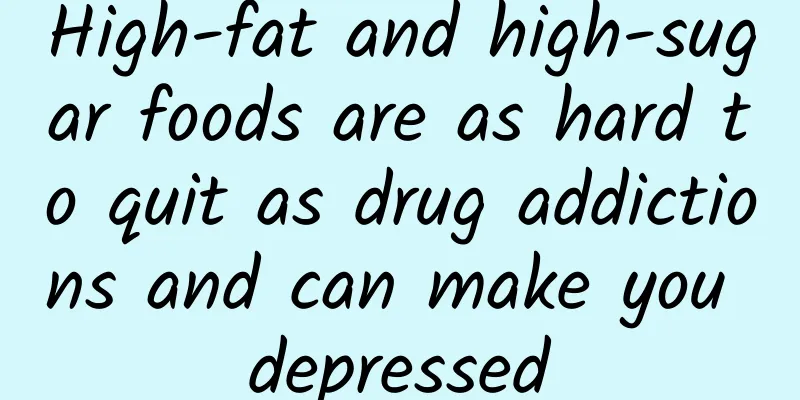High-fat and high-sugar foods are as hard to quit as drug addictions and can make you depressed

|
Why are cheese, donuts, gratin, and pizza so irresistible? Foods high in fat and sugar are like magic and are particularly difficult to quit. In fact, this is not just due to psychological factors. According to the latest animal experiments in Canada, eating high-fat, high-sugar foods regularly can cause changes in brain chemicals, and quitting them will cause symptoms such as depression and mood swings, just like quitting drugs. According to research, foods high in sugar or other fat, such as chocolate, can be as difficult to quit as drug addiction. In an animal experiment on mice, a research team led by Dr. Stephanie Fulton of the University of Montreal in Canada divided the mice into two groups: one eating a low-fat diet (11% fat content) and the other eating a high-fat diet (58% fat content). After six weeks of feeding, they found that there were big differences in the neurochemicals inside the brain. Mice that ate a high-fat diet had higher levels of stress-regulating corticosterone in their brains, and their CREB molecules also became very active. These chain reactions also affect the production of dopamine in the brain. Dopamine is a hormone that affects human emotional expression and makes people feel happy. However, the amount of dopamine in the brains of mice is relatively low, so they are prone to depression and negative emotions, such as hiding in corners and being afraid of open areas. This situation makes people who want to quit a high-fat diet, just like patients who are quitting drug addiction, experience emotional symptoms such as increased stress, increased sensitivity to external stimuli, and extreme depression. They are likely to return to a high-fat, high-sugar diet again, creating a vicious cycle. This also explains why people who are losing weight always find it difficult to control their desire to eat high-calorie foods. Once they lose control, they often get out of control and eat more. Dr. Fulton also said that in the research results, although the waist circumference of mice on the high-fat diet increased by 11%, it was still below the standard value for obesity (BMI value). These findings can help future research on the close relationship between food and the internal and external manifestations of the human body. When obese patients find it difficult to quit high-calorie diets during weight loss, it can also provide more directions to explore solutions. |
<<: Water jet liposuction reduces swelling and allows you to lose weight during lunch break
Recommend
Can cervicitis cause infertility in women? Women should do this to prevent cervicitis
Cervicitis is a very common gynecological disease...
Diagnosis and analysis of Bartholin's gland cyst
Bartholin's gland cyst can be diagnosed by th...
What to do if your endometrium is thickened
Endometrial thickening is also known as endometri...
How can patients with congenital absence of vagina take care of themselves?
How do patients with congenital absence of vagina...
Bulletproof coffee and reduced-sugar diet can help you lose weight and see your abs? Experts: Be careful to prevent nutrition exclusion, 4 tips for healthy weight loss
There are hundreds of ways to lose weight, and ma...
Is it normal to have less menstrual flow after miscarriage?
Is it normal to have less menstrual flow after mi...
Lower body "fat"? 3 ways to detoxify and remove dampness, you can also do it in the office
Do you sit for hours at work every day, with your...
How big is the uterine fibroid before surgery is needed? Treatment methods for uterine fibroids
As for uterine fibroids, we all know that the inc...
How long after pregnancy is it safer to have an abortion
Abortion surgery has certain health risks, and th...
How to detect early cervical precancerous lesions
What tests should be done for cervical precancero...
Experts tell you the causes of irregular menstruation
Many people think that irregular menstruation is ...
What are the classifications of uterine prolapse?
What are the classifications of uterine prolapse?...
What is the favorite "metabolism weight loss diet" of Hollywood actresses? Nutritionist teaches quick start
Haley, a well-known American nutritionist. Penloy...
Is vulvar leukoplakia contagious?
Based on the current clinical manifestations of v...
Can I stop taking medication for endometrial tuberculosis?
I started to have dysmenorrhea after getting marr...









